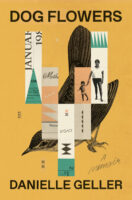Danielle Geller Interviewed in Superstition Review

In Issue 27 of Superstition Review, readers can find an interview with Danielle Geller conducted via email by Grace Tobin. The interview centers on Geller’s memoir Dog Flowers published by One World/Penguin Random House this year.
The interview opens with the story of how the title of Dog Flowers came to be. The two go on to talk about the decisions Geller made while writing the memoir: what to include or leave out, writing in a nonlinear storyline, and which diary entries and real life photos to include.
What was especially interesting to me was the discussion of how Geller’s ancestry helped shape the memoir:
SR: In an essay for the New Yorker, you wrote, “A Navajo blanket is woven on a loom and will never outgrow its frame. Do we finish the story our mothers began, or do we rip out the weaving and begin anew? It is not so easy to erase or forget the things that have come before us.” Did you have this question in mind while you wrote Dog Flowers? How did this meditation on your Navajo ancestry help to shape your memoir?
DG: I didn’t begin writing with this question in mind, though I kind of came to it through the revision and editing process. I wasn’t able to take my first Navajo weaving class until my last summer in Tucson. The other classes I took after I had already moved away when I was in the final stages of writing this book, but I think the lessons I learned from weaving helped guide me through the structure. The size and the shape of a Navajo rug are fixed before you ever start weaving. You warp the loom, and then you’re just working within the parameters you gave yourself at the beginning. You can change the design, but most Navajo rugs are geometrically balanced. The pattern at the end mirrors the beginning. In one of the early drafts of the book, it opened the way it does now: my mother is sick, she’s homeless, and I am going through her suitcases and taking account of all they held. And in that draft, the ending of the book mirrored the opening, except it was my father who showed up at my apartment, homeless, with a bag and all its contents. At some point in the writing process, I came to resent how much space, time, and energy my father took up in the book. I could see where the story was leading, and I wanted to take him out of the narrative entirely. But I couldn’t, not without pulling out all the writing I had already done, not without starting over. My family is part of the fabric of my identity. One of my weaving teachers, Barbara Teller Ornelas, said that her past weavings trigger memories of where she was in life, what she was doing, what her joys and worries were, and when she was in that process of creation. I think that’s true of my book, too. I feel like I’ve clipped the selvage cords and moved on.
The interview ends looking at what Geller is currently working on—something for readers to look forward to.
